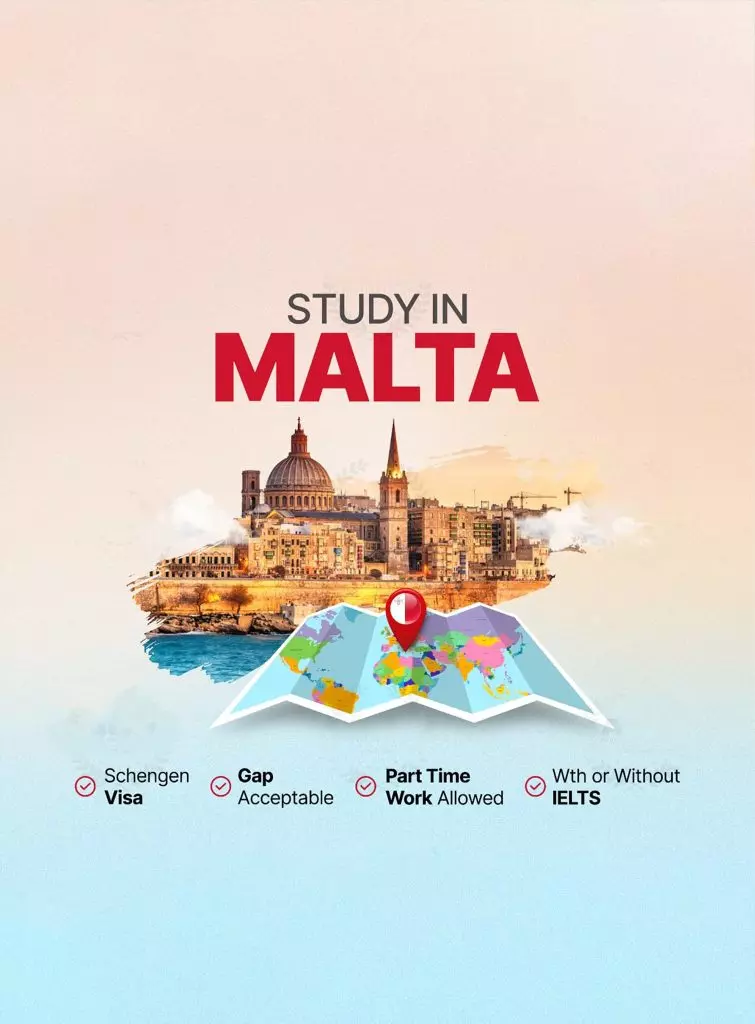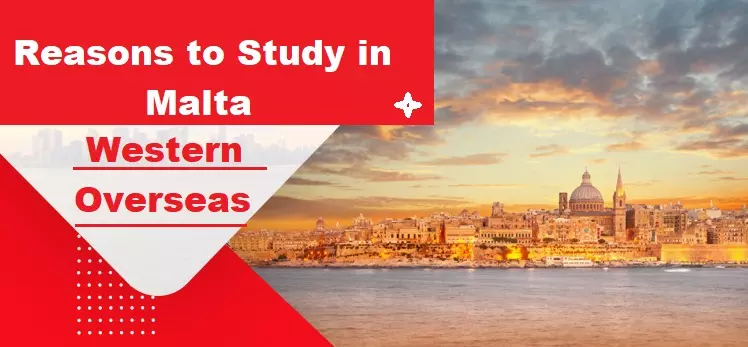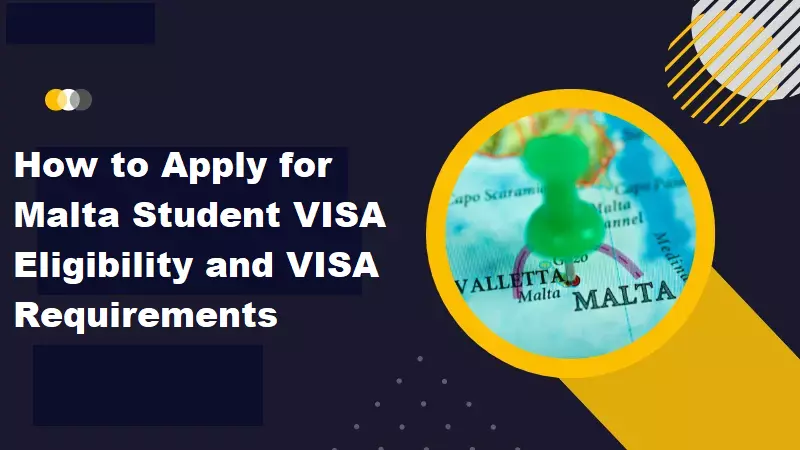
Malta is a beautiful country that has been a hotspot for various reasons. Its beauty, mesmerizing beaches, historical places, eye-catching tourist spots, and high standard of living and education are enough to allure students to choose the country for higher education. Studying in Malta has become a preferred choice in India to save money and have a quality life with never-ending career opportunities. Western Overseas help students learn about the country and why students should decide to study in Malta.
Malta, officially the Republic of Malta (Maltese: Republika ta Malta), is a densely populated developed country. Throughout its history, Malta's location in the Mediterranean Sea has given it strategic importance. The country is associated with the United Nations (since 1964) and a part of the "Europe and Union" (since 2004). Malta is also a member of the Schengen Agreement (since 2007) and the eurozone (since 2008).
People and Culture: Throughout Malta's long and chequered history, the people in Malta came into contact with the many countries that dominated the Mediterranean. The relationships with people of many different cultures made Maltese amongst the most cosmopolitan people in the world. That is also why studying in Malta is gaining much interest from Indian students.
Climate in Malta: The climate in Malta is warm and healthy. The average temperature in Winter (November till April) is 14°C, and that in Summer (May till October) is 23°C. In the winter, the Sun shines for about 7 hours, and around 10 hours in Summer.
Population: The population of Malta is 5.19 lakhs, as per the 2021 report.
Languages: English and Maltese are both official languages.

| Age in years | Phase | |
| 0 to 2 | Childcare is provided in some sectors, but if parents are both working it tends to be a family member, such as a grandparent who helps out during this phase. | |
| 3 to 5 | Early childhood | Education Day-care centers and nurseries. |
| 6 to 7 | First cycle | Primary school education in state schools is co-educational. There is one Independent boys school whilst the other Independent schools are co-educational. This is not the case in church schools; they are all single-sex schools. |
| 8 to 11 | Second cycle | During this phase, the school system starts preparing for the entrance exams. This is known as the Junior Lyceum exam. |
| 12 to 16 | Secondary School | Here the students prepare for their O levels (local Matsec GCSEs). When they are 13 years old they choose the main subjects which they will be studying. |
| 17 to 18 | Sixth Form. Students are allowed to join the Government system, the University Junior College, or a Private sixth form. | |
| 19 to 25 | University | The majority of students usually attend the University of Malta |

The nation offers many benefits to students who come there for higher education. Malta, a peaceful country, is known for its authenticity and friendly environment that encourages students to give 100% to their studies at every stage. International students enjoy the same benefits and rights as other native students. That attracts Indian pupils to become part of the beautiful Island. Here, we present the complete picture of why studying in Malta is no longer an uncommon option in India.
1. English mode of education: English is a universal language. In India, it is spoken widely after the native language, Hindi. Though Maltese is the official language, the education authorities emphasize providing education in English to make the nation a perfect study-abroad destination.
2. Part of the European Union: The nation is part of the European Union which offers the country many advantages people can cherish for a better living. It also provides economic stability, continuous global growth, and freedom to visit other European countries without burning a hole in the pocket. Students from India willing to pursue education in Malta must consider this point.
3. High standard of education: High quality of teaching makes the nation a favorable place for international studies. Students can grab practical knowledge along with learning theoretical concepts. Programs based on functional training boost students' confidence to pursue a dream career. So go ahead if you want to study in Malta.
4. Economic country: Economic stability enormously contributes to increasing interest among international students in Malta. Unlike other nations, the government offers affordable living and studying. So students can easily accommodate basic amenities while pursuing the course.
5. Perfect Climate: A pleasing climatic environment also allows the country to let people enjoy sunny days. So Indian students will relish studying there for sure.
6. Ultimate tourist place: Being a beautiful Island, the country has many beautiful places students can visit while studying there. So, along with pursuing the course, students can also enjoy the country's beauty.
7. Crowned the title of European Capital of Culture: The Island has the title of European Capital of Culture. Many international events are organized there to give the pleasure of participating and savoring the activities.
Students convinced by reading the above points and have decided to study in Malta must consult Western Overseas for a one-to-one consultation from our Malta student visa consultants. So, allow us to convert your dream into reality. Visit your nearest branch and discuss the study in Malta without IELTS or with IELTS.

Malta, known for its historic sites, is a favorite country of international students looking for a peaceful and lively place to pursue higher education. Today, we will decode the Malta student VISA process. We at Western Overseas will present a simplified version of the process, and experts will guide you through a step-by-step analysis. Stay tuned!
Malta, a Schengen visa country, requires visitors to have a visa in the following cases:
If you are not an EU/EEA/Schengen citizen
If you belong to a country other than the US, Canada, Australia, UK, Japan, South Korea, and New Zealand
Depending upon the intention of visiting the country, the country offers two types of VISA.
Short Stay VISA: This category, also known as Schengen VISA, is intended to allow people to have short-term stays in the country. This visa category will enable individuals to stay in the country for up to 90 days.
Long stay VISA: This subclass allows visitors to spend up to 365 days for any purpose. So, students considering studying here must apply for a study VISA.
Students must understand the different stages when applying for a study visa in Malta. A systemic approach invariably leads to fruitful results. The same formula is implied here too. Get started to explore the process.
1. Request for Offer letter
Studying in Malta for Indian students requires first applying for an offer letter. Students must collect recommended documents attested by legal authorities and then submit them to their preferred institution to get the offer letter. The country has a network of many renowned public and private universities. So, application fees can change depending on the university or college students are interested in.
The University of Malta, a public university, has application fees of 125 euros.
At EIE, a private institution, students must pay 220 Euro application charges.
2. Collect Following Documents
Academic certification or mark sheets (10th onward)
Graduation certificates
TRF score/ MOI
LOR (minimum 2)
Curriculum Vitae
Study gap proof (if any)
Passport
3. Lodge VISA File
Once students get the offer letter from the university, they must make a Demand Draft (DD) in the institution's name that is sent to the corresponding education authority to pay the tuition fees.
The next big step is to file the visa application. Students can apply for the visa at the Maltese embassy, consulate, or a visa application office. Students looking for professional consultants to lodge the file must consult Western Overseas, where you will have the support of Expert Malta study visa consultants. They can help you apply for an offer letter if you don't have one. The following steps are involved in completing the VISA application:
Book an appointment with the embassy nearest to the region
Get all documents ready to submit/attach with the visa application
Fill out the application form
Apply to embassy
Pay the application fee, which is around 270 Euro
The original and photocopy of the passport, valid for at least three months before departure, should be presented.
The Malta student VISA application form must be signed with the correct information. (e-mail address – mobile number-work phone number should be added correctly)
One photo is to be attached; the photo must have a passport format, full-face capture, and a light background. The image should have been clicked recently.
Copy the first page of the passport and the processed pages.
Copy of national identity card
Round-trip flight tickets
Applicant must present a Travel Health Insurance policy valid at least 15 days after the return date. Life and health insurance policies are not accepted.
Students must present
Original LOA by a Maltese Educational Institution, including details of the course/s and duration bearing the stamp of the institution and the signature of the school principal
An original bank receipt (stamped), signature circular of the bank, and the bank extract of the Euro account from which the payment is made (stamped), showing that the payment has been made directly from the applicant or by the sponsor to the school.
Bank documents of the last three months should be recently obtained, stamped, and signed and must show. An applicant may wish to present the Deed and commercial vehicle registration documents.
A detailed Permission Letter from the employer (on letterhead)
SGK Statements and payrolls for the last three months
All adult applicants (employed, unemployed, employee, or pensioner) and sponsors must present their SGK service documents with barcodes.
Employees and employers must present company documents such as activity reports, tax charts, signature circulars, and trade registry journals.
Farmers should present registration documents issued by the Chamber of Agriculture.
Students must present a recently issued student certificate with a barcode. This document can be obtained online. If the applicant does not have income, the sponsor (parents, legal guardians, or close relatives) must present a notarized letter of undertaking together with proof of subsistence. The Letter should be ORIGINAL and cover travel dates. The Letter of assignment should be taken recently issued. For students, 18 euros per day must be shown if your accommodation has been paid; 30 euros per day must be shown. A notarized copy of the sponsors' ID card should be attached.
If the applicant needs support, their sponsor should provide an original notarized undertaking letter. The Letter should have been issued in the past 15 days and clearly states that a daily amount of 48 euros for the whole stay will be covered, and the total amount should be mentioned. The sponsor's work documents are to be submitted.
Minors should present an ORIGINAL and recently issued notarized Letter of consent from BOTH parents. (even if one parent has custody rights.) Notarized copies of their ID cards should be attached.
All personal letters must be in English.
The whole VISA process takes around 2 to 2.5 months. So students should plan their studies accordingly. Students can meet our VISA consultants, who offer the best Malta student visa success rate, for more details. Our branches are in Delhi, Chandigarh, Indore, Amritsar, Jalandhar, Bathinda, Patiala, Ambala, Kurukshetra, Karnal, Sonipat, and Rohtak.